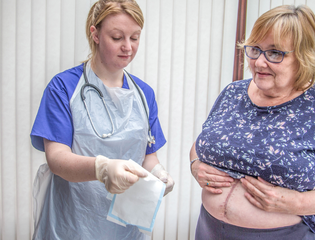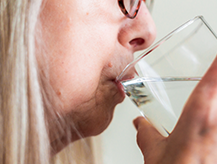Early or surgical menopause
The menopause usually happens naturally between the ages of 45-55 when levels of the female hormone oestrogen gradually decline and periods stop.
But if you have surgery to remove your ovaries, these hormonal changes may happen very quickly and sometimes straight away. This is known as surgical menopause.
Surgical menopause can be overwhelming. Your medical team should talk with you about this. If you have already gone through surgery it is important to share any worries that you have with your medical team or GP. It may be possible to be referred to a menopause specialist, who may be part of a gynaecology or sexual health team.
Symptoms of surgical menopause
Short-term symptoms
- Hot flushes
- Anxiety
- Mood changes
- Palpitations
- Night sweats
- Feeling irritated
- Symptoms that may occur in the short term:
- Poor concentration
- Insomnia
- Poor memory
- Loss of self-esteem
Long-term effects
- A dry vagina
- Thinner and drier skin
- Lower or no sex drive
- Bladder problems
- Joint aches and pains
The levels of the hormones oestrogen and also testosterone (another important female hormone produced by the ovaries) start to reduce during the perimenopause. The perimenopause is when your body starts to move naturally towards menopause. Hormone levels then become very low and continue to be low during the menopause. The levels reduce immediately after ovaries are surgically removed.
Menopausal women with low levels of oestrogen have an increased risk of diseases such as heart disease, osteoporosis, type 2 diabetes, depression and dementia.
If you would like further information and advice on managing your menopausal symptoms, talk to a healthcare professional who has a particular interest in the menopause, who can provide evidence based information, advice and treatment.
Hormone Replacement Therapy (HRT)
HRT can relieve symptoms and benefit long-term health by replacing some hormones. Most women with ovarian cancer can safely take HRT. It may not be suitable for all women with ovarian cancer so you should discuss taking HRT with your medical team or a menopause specialist.
There are many different types and doses of HRT. All types of HRT contain oestrogen and the type and doses of HRT you need vary between each person. The HRT replaces the oestrogen that your ovaries no longer make after the menopause.
HRT is known to:
- Prevent loss of bone strength
- Maintain a healthy heart
- Promote cognitive health (memory and thinking skills)
- Prevent vaginal discomfort
- Help with hot flushes
- Help with bowel health
How is HRT given?
After a surgical menopause HRT is given as one hormone (oestrogen therapy) and can be given via tablets, patches, gels and sprays. Those who still have a womb also need to take progesterone.
Testosterone is also a hormone which can improve symptoms of low mood, reduced energy, brain fog and low libido. This is not currently licensed for women in the UK but it is still available on a prescription from healthcare professionals who specialise in the menopause.
What are the side effects of HRT?
You may not experience any, but side effects of HRT may occur in some people and can include breast tenderness, headaches and leg cramps. They usually improve with time.
Occasionally a change in dose or type of oestrogen will be necessary and your doctor will work with you to find the most appropriate dose and type. You may need to try a few different types of HRT before finding one that suits you.
What are the risks?
There has been a lot of research into HRT and its safety in general but not so much is known about the risks and the benefits after surgery for ovarian cancer.
It is important to discuss the matter with your doctor and, if possible, get a referral to someone who specialises in dealing with those who are experiencing the menopause because of cancer treatment.
Depending on your situation, you may decide to use HRT on a short-term basis for symptoms relief, for a longer-term basis for its health benefits, or not at all.
The guidelines and evidence state that women can continue to take HRT as long as the benefits outweigh risks. As there are health benefits from taking HRT this means that women can safely continue to take HRT forever to replace their missing hormones.
Vaginal oestrogen
Vaginal oestrogen is given to treat changes in the vagina after a surgical menopause and can be used alone or alongside conventional HRT.
Vaginal oestrogen will help treat your vaginal dryness and improve comfort. Vaginal oestrogen will not help other menopausal symptoms but is associated with fewer side effects and risks.
It is also known as topical oestrogen as it is applied directly to the vagina using creams, gels, pessaries (a soft, flexible device that is placed in the vagina) or vaginal rings.
Women who use vaginal oestrogen can also safely take HRT. All of these can help to reduce vaginal dryness and sexual discomfort.
Alternatives to HRT
If you choose not to use HRT or have a medical reason not to, other medications can be prescribed.
Citalopram, paroxetine and venlafaxine are antidepressants but they can help with menopausal flushes and sweats when used at low doses.
If later in life you experience bone density loss, you may be prescribed drugs to treat osteoporosis (a condition that causes bones to weaken and become more fragile).
Cognitive Behavioural Therapy (CBT) has been proven to be a safe and effective treatment for women who experience menopausal symptoms such as hot flushes and night sweats with additional benefits to mood, sleep and quality of life.
CBT helps you to manage these problems by changing the way you think and behave. The CBT Register UK allows you to search for a therapist in your area: cbtregisteruk.com or you can ask your GP for a referral to your local therapy service.
There are lots of herbal and dietary supplements aimed at helping with the menopause. The evidence is inconsistent so you may wish to ask a pharmacist for advice as these can interfere with other medicines. These remedies may also contain phytooestrogens (plant substances which have a similar chemical structure oestrogen).
You may wish to ask your team or a pharmacist for advice.
Where to go for advice and support
Menopause Matters is an independent website providing up-to-date, accurate information about the menopause, menopausal symptoms and treatment options.
Henpicked also contains lots of information about the menopause, including early and surgically-induced menopause.
The Daisy Network has lots of useful information for younger women who are having issues with early menopause.
You can also read Laura Moses’s experience of going through the menopause as a young woman.
Download A Younger Woman's Guide to Ovarian Cancer for more information.


